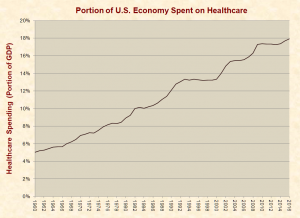 I consider myself fortunate. As a military veteran, I have access to excellent healthcare through the VA. However, most of my clients don’t have such good fortune. They have to pay for their healthcare and the insurance company makes medical decisions for them. Often, they are faced with high deductibles, co-payments, and procedures that aren’t covered by their insurance. As one of the richest nations on earth, why is our healthcare system in such a sorry state?
I consider myself fortunate. As a military veteran, I have access to excellent healthcare through the VA. However, most of my clients don’t have such good fortune. They have to pay for their healthcare and the insurance company makes medical decisions for them. Often, they are faced with high deductibles, co-payments, and procedures that aren’t covered by their insurance. As one of the richest nations on earth, why is our healthcare system in such a sorry state?
The United States spends twice as much on healthcare as 10 other high-income nations, driven by the high price of everything from prescription drugs to doctors’ salaries, a new study in the Journal of the American Medical Association finds.
“Most countries get to lower prices one of two ways: they either have a very strong price setter, usually a government agency, or more efficient markets,” said Dr Ashish Jha, co-author of the study by researchers at Harvard’s TH Chan School of Public Health. “The US has figured out how to do the worst of both.”
In the study, America was compared to 10 other countries: the United Kingdom, Canada, Germany, Australia, Japan, Sweden, France, Denmark, the Netherlands and Switzerland. Salaries for physicians in the US are nearly double those in the other countries surveyed.
The US also spends more on administrative costs. Other nations spend between 1%-3% to administer their health plans. Administrative costs are 8% of total health spending in the US.
This results in US health costs that, as a percentage of gross domestic product, are nearly double that of other nations. In 2016, the US spent 17.8% of GDP, compared to 9.6%-12.4% in other countries.
At the same time, America often had the worst population health outcomes, and worst overall health coverage.
Greed or at least high prices drive the healthcare economy in the US. Until that issue is addressed, Americans will continue to be at the bottom of the barrel in terms of quality healthcare.
